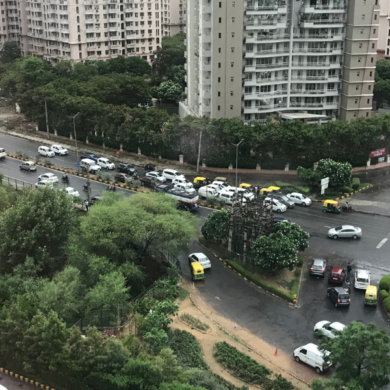
Can foreigners buy property in India? Yes, but only under specific conditions – while NRIs and OCIs have broader rights, other foreign nationals must follow property laws for foreigners in India, such as FEMA and RBI regulations.
The country’s booming real estate market attracts investors from around the world, but can foreigners buy property in India? The answer is not as straightforward as it seems. Foreigners property purchase in India depends on factors such as residency status, intended use of the property, and the category of property being considered. In this blog, we will explore the rules, limitations, and opportunities in the realm of real estate investment for foreigners in India.
Table of Contents
Understanding the Legal Framework for NRIs
Property laws for foreigners in India are governed by Foreign Exchange Management Act (FEMA), 1999, along with directives issued by Reserve Bank of India (RBI). Foreign individuals are categorised as Non-Resident Indians (NRIs), Overseas Citizens of India (OCIs), or foreign nationals.
NRIs and OCIs are allowed to purchase residential and commercial properties in India without prior RBI approval. However, foreign nationals who reside outside India are generally restricted from buying immovable property, unless specific conditions are met.
Types of Property Foreigners Can Buy in India
The answer to the query – can foreigners buy property in India – depends on the category of property, as regulations and guidelines differ for residential, commercial, and agricultural assets.
-
Residential Properties
Foreign individuals, including NRIs and PIOs, can purchase residential properties in India including apartments, row houses, villas, and plots.
-
Commercial Properties
Foreign entities, including companies and individuals, are eligible to purchase commercial properties in India. The guidelines for foreigners property purchase in India may vary depending on the sector and nature of the investment. Approval from RBI or other regulatory bodies may be necessary in certain cases, depending on the nature and scale of investment.
-
Agricultural Land
Foreigners, including NRIs and PIOs, are generally not allowed to directly acquire agricultural land in India. However, there are certain exceptions and provisions for PIOs who have inherited agricultural land, or have received it as gift. In such cases, they are permitted to hold and transfer agricultural land, as per the regulations specified by the respective state governments.
Eligibility Criteria for Foreigners Property Purchase in India
Can foreigners buy property in India if they meet certain criteria? Let us explore the key requirements for real estate investment for foreigners in India
Citizenship Requirements
- Non-Resident Indians: NRIs are Indian citizens residing abroad, and they hold Indian passports. NRIs are eligible to purchase both residential and commercial properties in India without any restrictions.
- Persons of Indian Origin: PIOs are individuals who or whose ancestors held Indian citizenship, and have since acquired the citizenship of other countries. PIOs are also allowed to buy both residential and commercial properties in India.
- Foreign Nationals: Foreigners property purchase in India is subject to specific restrictions and conditions.
Residency Status
Apart from citizenship requirements, foreigners interested in buying property in India should also consider their residency status, which is related to the duration and purpose of their stay in the country.
The following categories apply:
- Resident Indians: Resident Indians are Indian citizens who reside in India for a minimum number of days each year. They are not subject to any restrictions while purchasing property in the country.
- NRIs & PIOs: They have the same property ownership rights as resident Indians, and can freely purchase property in India.
- Foreign Nationals: Foreign nationals who do not fall under the NRI or PIO categories are subject to certain restrictions. They may need to obtain specific permissions and adhere to additional guidelines and regulations set by RBI and other regulatory authorities.
Key Restrictions and Conditions
Real estate investment for foreigners in India is subject to strict regulatory controls under FEMA and RBI guidelines. The following are the key restrictions and conditions that govern property ownership for foreign nationals:
-
Eligibility Based on Residential Status
Only NRIs and OCIs are allowed to purchase immovable property in India, limited to residential and commercial assets. Foreign nationals residing outside India are not permitted to buy property without prior permission from RBI, except in cases of inheritance or diplomatic purposes.
-
Restrictions on Agricultural and Plantation Land
Even NRIs and OCIs are not permitted to purchase agricultural land, plantation property, or farmhouses. Such properties can only be inherited, not directly acquired through purchase.
-
Mode of Payment
All transactions must be conducted in INR, through funds received in India via normal banking channels. The payment must be made through an NRI’s or OCI’s Non-Resident External (NRE), Non-Resident Ordinary (NRO), or Foreign Currency Non-Resident (FCNR) account.
-
Purpose of Use
The purchased property must be used for personal, residential, or commercial purposes. Leasing it out is permitted, but using the property for industrial or agricultural operations remains prohibited.
-
Repatriation of Sale Proceeds
In the event of resale, repatriation is subject to specific conditions and limits defined by RBI. The original amount invested in the property can usually be repatriated, but gains may be subject to tax and remittance regulations.
Financing Property Purchase for Foreigners
Foreigners can avail home loans from Indian banks and financial institutions to finance their property purchases. These loans are offered at competitive interest rates and repayment terms. Indian banks have specific regulations in place for providing home loans, that ensure the loan process is transparent and compliant with legal requirements.
Foreigners property purchase in India requires submission of additional documents such as:
- Passport Copies
- Employment Details
- Income Proof
Tax Implications for Foreigners Buying Property
- Property Taxes: These are applied on market value of the property, and vary across different states and cities in India. Tax rates may also differ for residential and commercial properties.
- Capital Gains Tax: Foreigners selling property in India may be subject to this tax. Liability depends on the period for which the property was held, before being put on sale. If the holding period is more than 24 months, it is known as a long-term capital asset, and the gains are subject to long-term capital gains (LTCG) tax. If the property is held for 24 months or less, it is considered a short-term capital asset, and the gains are subject to short-term capital gains (STCG) tax.
- Repatriation of Funds: Foreigners are allowed to repatriate funds from the sale of property in India, subject to certain conditions. Repatriation is permitted up to the amount equivalent to the initial investment made to acquire the property.
Transfer of Property to Foreign Nationals
This is closely regulated by property laws for foreigners in India, to prevent unauthorised transactions and ensure compliance with FEMA and RBI norms. The procedures and restrictions must be carefully followed to maintain legal validity.
Procedures and Documentation for Transfer
Transferring property to a foreign national requires thorough documentation and adherence to due process. Key documents include registered sale deed, title documents, PAN card, identity and address proofs of both parties, and RBI approval wherever applicable.
Benefits of Real Estate Investment for Foreigners in India
The country’s real estate market is gaining global attention due to its scale, evolving regulations, and high return potential. Key advantages include:
-
Strong Market Potential
India’s real estate sector is driven by rapid urban growth, young population, and rising demand across residential & commercial segments. This creates a favourable environment for foreigners property purchase in India, with capital appreciation and steady rental income in metros and Tier-I cities.
-
Attractive Returns on Investment
With property values steadily increasing in key regions, investors can tap into both capital gains and recurring income. Strategic locations such as Bangalore, Gurgaon, and Hyderabad are known for their investor-friendly outlook.
-
Favourable Government Policies
World-class initiatives like GIFT City in Gujarat offer foreign investors tax incentives, regulatory ease, and global-standard business environment. Such developments align with the country’s vision of encouraging real estate investment for foreigners in India.
-
Improved Regulatory Framework
Reforms like RERA and digitised land records have enhanced transparency and investor protection. These measures contribute to increased trust among foreign stakeholders evaluating long-term investments in the Indian property market.
Documents Needed to Buy Properties in India by NRI
- Title deed, in the seller’s name
- Sanctioned building plan
- Certificate of commencement
- Occupancy Certificate
- Receipts paid for tax
- Encumbrance Certificate
- Documents of khata / mutation
List of Required Documents at the Time of Registration
- PAN Card
- PIO or OCI card
- Passport
- Passport size photographs
- Address proof
Can Foreigners Inherit Property in India?
Inheritance laws in India extend to both Indian citizens and foreign nationals, including NRIs and PIOs. These property laws for foreigners in India ensure rightful succession, while adhering to legal and religious frameworks. Key points include:
- Eligibility for Inheritance: Property can be inherited by legal heirs such as spouses, children, and parents; as well as individuals named in a valid will. Both categories are recognised under Indian law.
- Governing Legal Framework: Indian Succession Act, 1925 outlines rules for distributing property, administering estates, and protecting the rights of legal heirs and beneficiaries.
- Inheritance Rights for Foreign Individuals: NRIs, PIOs, and even foreign nationals can inherit residential, commercial, and agricultural property in India. These rights are recognised under the same legal framework that applies to Indian citizens.
- Influence of Personal Laws: Inheritance is also governed by religion-specific personal laws – such as Hindu Succession Law, Muslim Personal Law, and Christian Inheritance Law.Read More: NRI Investment in Indian Real Estate Market – A Complete Guide
Can Foreigners Sell Property in India?
Foreign nationals can sell property in India, but the process must align with FEMA regulations and relevant property laws for foreigners in India. Key aspects include:
- Legal and Regulatory Framework: FEMA governs every real estate investment for foreigners in India, ensuring foreign exchange compliance and legal transparency.
- Repatriation of Sale Proceeds: Foreign sellers may repatriate the original investment amount in foreign currency, but additional capital gains can be repatriated only after paying applicable taxes as per RBI guidelines.
- State-wise Compliance: State-specific rules may apply during the sale process. Documentation and procedures must align with property laws for foreigners in India and registration requirements.
- General Restrictions: There are no separate restrictions on foreigners selling property in India, provided the property was acquired lawfully and meets regulatory criteria.
Documents Required by NRI for Selling Property in India
- Passport
- PAN Card
- Tax Returns
- Sale Deed
- Address Proof
- Encumbrance Certificate
How Can Foreigners Buy Property in India? – Procedure
Buying property in India as a foreigner involves a defined set of steps that cover legal, financial, and procedural aspects. Key stages in the process include:
- Research and Property Selection: Begin with market research on locations, pricing, and legal conditions; and select a property that aligns with your personal goals and budget
- PAN Card Requirement: PAN card is mandatory for property transactions, and must be obtained from the Income Tax Department before proceeding
- Legal Advisory Support: Appoint a legal expert to verify ownership documents such as title deed, EC, and sale agreement; and to oversee due diligence
- Financing the Purchase: NRIs can avail home loans from Indian banks or housing finance companies, with the loan processing involving document submission and RBI approval
- Execution and Registration: The sale deed must be signed in the presence of witnesses and registered at the relevant Sub-registrar’s Office to establish legal ownership
Outlook and Market Trends
Real estate investment for foreigners in India continues to evolve as a promising landscape. According to Consolidated FDI Policy, 2020, 100% FDI is allowed under the automatic route for townships, housing, commercial premises, infrastructure, and educational institutions – encouraging sustained international interest in the country’s development projects.
The commercial office space market remains a key driver, particularly in Bangalore, Hyderabad, and Mumbai. As highlighted in the CREDAI-Colliers report, foreign capital is increasingly flowing into this segment through Real Estate Investment Trusts (REITs). These instruments offer annual returns in the range of 8% to 12%, surpassing many global benchmarks.
Challenges Faced by Foreign Investors
-
Bureaucratic and Regulatory Complexities
Navigating multiple layers of approvals, compliance under FEMA, and varying state-level procedures can lead to delays and administrative hurdles. Despite recent reforms, foreigners property purchase in India may still involve significant documentation and coordination with government agencies.
-
Exchange Rate Fluctuations
Currency volatility can impact returns while converting profits or sale proceeds into foreign currency. Shifts in exchange rates may reduce the effective value of the investment, particularly in long-term holdings.
Conclusion
Investing in Indian real estate offers foreign nationals a strong mix of growth potential, rental yields, and long-term value – provided the process is approached with legal clarity and regulatory compliance.
Can foreigners buy property in India? Yes, but the answer depends on their residential status and purpose of investment. With evolving transparency, growing commercial demand, and supportive property laws for foreigners in India, the country remains a promising destination for global property investors.
FAQs
1. Can a foreign national buy residential property in India?
Yes, a foreign national can buy residential property in India, only if they qualify as Non-Resident Indian (NRI) or Overseas Citizen of India (OCI); otherwise, prior approval from Reserve Bank of India is required.
2. Can foreigners buy agricultural land in India?
No, foreigners cannot buy agricultural land in India, even if they are NRIs or OCIs, unless the land is inherited or received as a gift in accordance with state regulations.
3. Can foreign companies invest in Indian real estate?
Yes, foreign companies can invest in Indian real estate, but only in development projects such as townships, housing, infrastructure, and commercial premises – as permitted under the Consolidated FDI Policy.
4. Are NRIs and OCIs considered foreigners for property purchases?
NRIs and OCIs may be considered foreigners for property purchases in India, but are granted the same rights as resident Indians while buying residential and commercial properties.
5. Can a foreigner get a home loan in India?
Yes, a foreigner can get a home loan in India if they qualify as an NRI or OCI, subject to eligibility criteria and documentation laid down by RBI and followed by Indian banks and financial institutions.
6. What taxes do foreigners have to pay while buying property in India?
Foreigners have to pay property taxes while buying property in India, and are liable to pay capital gains tax (LTCG / STCG) upon resale, depending on the holding period.
7. Can a foreigner inherit property in India?
Yes, a foreigner can inherit property in India, under the Indian Succession Act and personal laws – including residential, commercial, and agricultural land.
8. Can a foreigner sell property in India?
Yes, a foreigner can sell property in India, if it was lawfully acquired and the sale complies with FEMA regulations and applicable tax laws.
9. Do foreigners need RBI approval to buy property in India?
Yes, foreigners need RBI approval to buy property in India, unless they are classified as NRIs or OCIs who are allowed to purchase without prior approval.
10. Can a foreigner rent out property in India?
Yes, a foreigner can rent out property in India, if it has been acquired legally and all income earned complies with Indian tax regulations.









